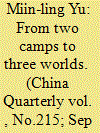| Srl | Item |
| 1 |
ID:
124647


|
|
|
|
|
| Publication |
2013.
|
| Summary/Abstract |
The worldview as reflected in the textbooks of the People's Republic of China during 1949-1966 centred on Party-led nationalism, anti-imperialism and anti-colonialism. This article emphasizes both the continuities and changes in nationalist ideology during the Republican and Maoist periods. First, textbooks in Maoist China presented the imperialist powers as shifting away from Britain, Russia and Japan under the KMT government and towards the United States (since 1949) and the Soviet Union (since the 1960s), and emphasized class struggle. Second, the CCP had far greater control over the production of textbooks than the KMT. In this sense, the CCP truly carried out "partified" (danghua) education, a goal shared by the KMT which it never had the ability to achieve. In addition, "the language of Cultural Revolution" appeared with the outbreak of the Korean War. In other words, the education that cultivated revolutionary successors began in the early 1950s.
|
|
|
|
|
|
|
|
|
|
|
|
|
|
|
|
| 2 |
ID:
179334


|
|
|
|
|
| Summary/Abstract |
This article examines the phenomenon of Cambodian intellectual curiosity about China through the social experiences of Phouk Chhay, a prominent leftist activist-critic and Pol Pot's one-time secretary. Amid Phnom Penh's urban radical culture, Phouk transformed from rural student to Communist guerrilla. He associated with Communists, formed pro-China student associations, and through his networks, went on trips that left lasting impressions. This study draws from issues of the Cambodian-Chinese newspaper Mianhua ribao (Sino-Khmer Daily) and several forced confessions to tell a story of becoming that examines community and network in charting the course of ‘China-curiosity’ as intertwined with Phouk's life trajectory.
|
|
|
|
|
|
|
|
|
|
|
|
|
|
|
|